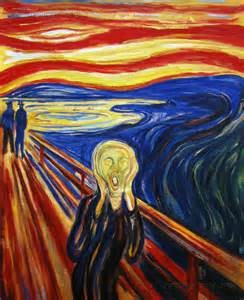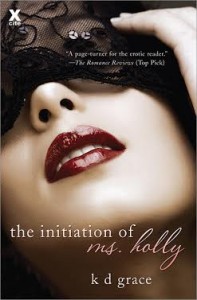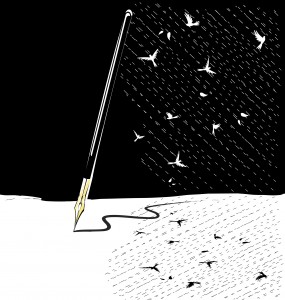 If I’ve promised myself anything this year it’s that I’ll write for fun. It all started out that way, back when I was a kid and wrote my first stories. It was always fun – the writing. It was always magical to sneak away into my head and spend time with the people I made up. Things got more complicated when I began to engage with the world of publishing and, by the time I’d published my first novel, I always had an agenda. There was always at least one novel or story or novella that I was contracted to do ahead of the one I was working on at the time, most often, there were several.
If I’ve promised myself anything this year it’s that I’ll write for fun. It all started out that way, back when I was a kid and wrote my first stories. It was always fun – the writing. It was always magical to sneak away into my head and spend time with the people I made up. Things got more complicated when I began to engage with the world of publishing and, by the time I’d published my first novel, I always had an agenda. There was always at least one novel or story or novella that I was contracted to do ahead of the one I was working on at the time, most often, there were several.
Something about having a full dance card always made me feel like I was a proper writer, like I was legitimate. I never said no. Never! I felt like if I ever once turned anyone down, I’d jinx my success and no one would ever ask me to write for them again. Neurotic much???
Along with my ‘writing legitimacy’ PR, marketing and social media suddenly became essentials. I damn sure wasn’t going to let a book of mine languish after I’d gone to all the effort to write it. But how much is enough PR and marketing? How involved do I need to be in social media? Where and who and how often? And then there were readings and conferences and get-togethers with other writers and readers – all things I enjoyed, all things I tried never to miss. It’s exciting to be able to share my work with other people, and I love that part of promoting.
The thing is, at some point along the line the whole experience became wrapped up in my neuroses. It all became a task I felt I had to do, what I thought was expected of me. It all became wrapped up my fear of what might happen if I said ‘no’, if I chose to take a break. Somewhere along the line there became more and more rules and less and less room for me to play. I’m not blaming anyone. I think this is a struggle all writers have. But once I finished writing Interviewing Wade, I decided that from now on I’d be writing a whole lot more for fun, that I’d be brave enough to experiment again, to play with words and ideas and stories again and to see where those experiments lead me.
I felt I had to do, what I thought was expected of me. It all became wrapped up my fear of what might happen if I said ‘no’, if I chose to take a break. Somewhere along the line there became more and more rules and less and less room for me to play. I’m not blaming anyone. I think this is a struggle all writers have. But once I finished writing Interviewing Wade, I decided that from now on I’d be writing a whole lot more for fun, that I’d be brave enough to experiment again, to play with words and ideas and stories again and to see where those experiments lead me.
If the writing is no longer fun, then it’s not worth the doing. Writing the story has been the passion of my life for as long as I can remember, and I feel extremely lucky to have had some success. I’ve had so many reasons to celebrate because of this writing journey. But success, any success, is a very dangerous threat to fun. After I’ve popped the Champaign corks, after I’ve celebrated with my friends, after I’ve flashed my latest baby all over Facebook and Twitter, when I’m lying in bed in the dark, that’s when I begin to doubt myself, doubt my success, doubt that I’m capable of the next step required to move forward. That’s a real joy-stealer, and one I battle every day, as I’m sure many writers do.
The joy of writing, for me, is in seeing the story unfold and in knowing that I’m the conduit through which it unfolds. Frankly there are times when it feels a whole lot like magic. The fun is in watching the characters surprise me on the written page, the power – my power – comes from the play of it far more than from the work of it. This is a fact, and one I MUST remember at all cost.
Lisabet Sarai wrote a wonderful article for Erotic Readers and Writers Association a couple of months ago called The First Time. The article is about the power of the first novel, and how many first novels became iconic in the body of an authors’ work. Even though those first novels are not the best writing the author will ever produce, even though on the level of the story and the characters they may not be the best, somehow they speak to the readers on a visceral level in ways that later, better crafted novels by that same author just can’t seem to manage. I thought about that for a long time and, as I work to restore the joy and the play in writing, I’ve come up with a possible theory as to why so many of those first novels are so powerful. I think it just might be because those first novels are often writers playing, experimenting, discovering their powers and just trying to see what they’re capable of and what fun they can have with that creative energy. One of my very favourite authors of all time, a goddess in the craft, Diana Gabaldon, says she wrote her stunning first novel, Outlander, for practice never imagining that it would be published!
 When I wrote The Initiation of Ms Holly, I wrote it totally as a romp, as a wild raucous joy ride that I absolutely played with and had fun with. At that point I had no intention of writing another erotic romance; I was experimenting. I was having fun. That was nine novels – under two pseudonyms — multiple novellas and a gazillion short stories ago. Though it’s been a fabulous ride, I’ve had to constantly remind myself that I’m a storyteller first and foremost, and I do it for the joy of it. I do it because in my heart, I know I’m not fit to do anything else.
When I wrote The Initiation of Ms Holly, I wrote it totally as a romp, as a wild raucous joy ride that I absolutely played with and had fun with. At that point I had no intention of writing another erotic romance; I was experimenting. I was having fun. That was nine novels – under two pseudonyms — multiple novellas and a gazillion short stories ago. Though it’s been a fabulous ride, I’ve had to constantly remind myself that I’m a storyteller first and foremost, and I do it for the joy of it. I do it because in my heart, I know I’m not fit to do anything else.
It’s not that I no longer have fun with what I write. There are times when the pure joy of creating a world and characters and throwing them all together to see what will happen is just about as near an ecstatic experience as it’s possible to get on a keyboard. But if there is some truth in the fact that first novels are often so good because their authors are still playing with words, still revelling in the joy of the creative process, then it seems to me that as writers, anything we can do to get ourselves back to that first novel playtime sense of creativity, we most certainly need to do.
What does that mean? What does that even look like? I honestly don’t know. What I do know is that it’ll involve taking some risks, letting go of the white knuckle grip of control I’ve had on my work and my time for the past few years and seeing what happens when I’m willing to just play with it, IF I can still be willing to just play with it.
Some of that play, some of that experimentation will be coming out on my blog in the future. I learned when I wrote the serial Demon Interrupted that there were lots of ways of using my blog that were far more interesting than saying ‘here’s this book. You should read it’ – whether it’s my book or someone else’s
 But if I want to connect with my readers, if they really want to know who I am, then the best thing I can do is share my words, share my creative process, share my stories. Some of you may have already guessed that I’m playing around a bit with the ‘Morphine Dreams’ and the ‘Alonso Darlington’ writings. There’ll be more playing around, and there’ll be more stories, and more experimenting. There’ll still be some ‘read my stuff’ promos and some blitzes and some really fabulous guests. But I’m reserving the right to play – on my blog as well as in the stories I write. Because play is at the centre of my creativity. It’s the place where the next story waits to unfold itself, and without that sense of fun and play what’s the point?
But if I want to connect with my readers, if they really want to know who I am, then the best thing I can do is share my words, share my creative process, share my stories. Some of you may have already guessed that I’m playing around a bit with the ‘Morphine Dreams’ and the ‘Alonso Darlington’ writings. There’ll be more playing around, and there’ll be more stories, and more experimenting. There’ll still be some ‘read my stuff’ promos and some blitzes and some really fabulous guests. But I’m reserving the right to play – on my blog as well as in the stories I write. Because play is at the centre of my creativity. It’s the place where the next story waits to unfold itself, and without that sense of fun and play what’s the point?
Great blog you should always write for the joy and fun.
Thank you Phaedra. I’m so glad you enjoyed it. That’s my plan!
More Alonso!!
Oh Alonso will be showing up again, no worries, Alison 🙂
Lovely morning read with delicious coffee, fire and snugly throw. I thoroughly enjoy your blogs. xxo to you and Raymond.
Thanks so much Sissy! I’m glad you enjoy the posts, and I’m very honoured that you are a regular reader 🙂
K xxx
Interesting blog. I think the syndrome of first work often being the best extends to other creative activities too – how many bands are out there whose first album is their best? It must be because you create without pressure from outside from publishers/music executives etc. And it’s worse the more successful you are because then the pressure is really on to produce more of the same.
I think you’re right, Nano. When there’s no pressure, we can play — whether it’s words or music, and it’s very hard to recreate that attitude of play when you’re up against a deadline.
KD, you’ve said so perfectly here everything I’ve been thinking about since I had to start balancing writing with promotion. Without nearly being on your same success run and productivity, I still was feeling some of the joy being zapped. You’ve defined the process so well here, what shifts, and you’ve hit on why I probably love so many musicians at the starts of their careers. First writing, the creation, losing ourselves in that other world–that’s the most fun and I think what activates something in our brains that the thrill of publications and promotions simply doesn’t match. Thank you! I love this!
Thanks for your lovely comments, Patricia. I totally agree with you, and I think it’s vital for all writers — all artists — to find a way to connect with the joy of that creative process.
K xx